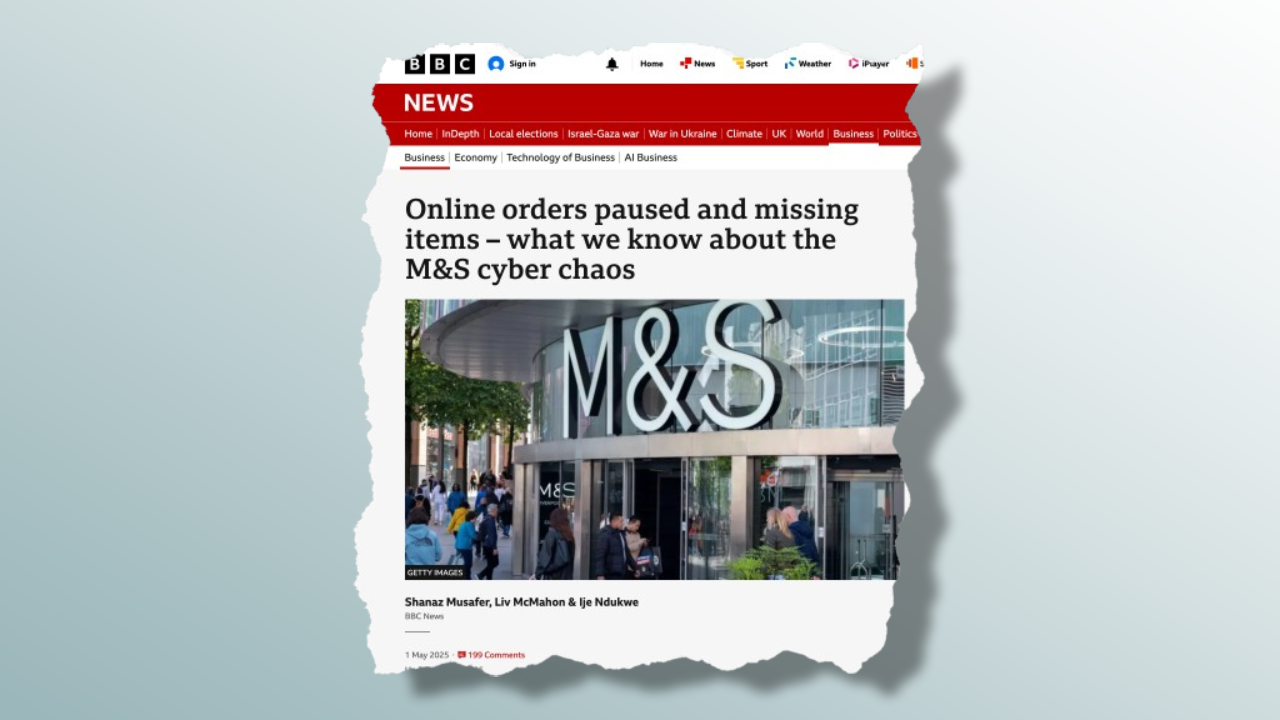Introduction
In April 2025, Marks & Spencer (M&S), a cornerstone of British retail, was hit by a devastating ransomware attack that crippled its digital infrastructure, halted online operations, and exposed systemic vulnerabilities. The incident, attributed to the cybercriminal group Scattered Spider, underscored the escalating sophistication and impact of cyber threats on major enterprises. Amidst this turmoil, the analytical predictions presented by Future Master Network (FMN) in their article, The Strategic Evolution of Ransomware Risk (2025–2030), emerged as remarkably prescient, offering a comprehensive framework that anticipated the multifaceted nature of such cyber threats.

The M&S Cyberattack: A Case Study in Modern Cyber Threats
The ransomware attack on M&S disrupted critical operations, including online ordering systems, supply chain logistics, and internal communications. Employees resorted to using personal devices and alternative communication platforms like WhatsApp due to compromised systems . The financial repercussions were significant, with estimated weekly losses of £40 million and a substantial decline in market value . The attack highlighted not only the technical vulnerabilities but also the organizational unpreparedness in crisis management and cyber resilience.

FMN’s Predictive Accuracy: Aligning Forecasts with Reality
FMN's analysis delineated several key trends in the evolution of ransomware threats, many of which manifested in the M&S incident.
1. Ransomware-as-a-Service (RaaS) and the Democratization of Cybercrime
FMN emphasized the rise of RaaS, where sophisticated ransomware tools are made available to less technically skilled actors, increasing the frequency and scale of attacks. The M&S breach, executed by Scattered Spider—a group known for leveraging RaaS platforms—exemplifies this trend .
2. AI-Enhanced Attacks and Behavioral Adaptation
The report predicted the integration of AI in ransomware campaigns, enabling malware to adapt dynamically to target environments. While specific details of AI usage in the M&S attack remain undisclosed, the attackers' ability to disrupt multiple systems and evade detection suggests a level of sophistication consistent with AI-enhanced strategies.
3. Supply Chain Vulnerabilities
FMN foresaw increased targeting of supply chains, exploiting vulnerabilities in third-party vendors. M&S's reliance on external IT contractors and a hybrid work model may have contributed to the breach, aligning with FMN's warnings about extended attack surfaces through supply chain dependencies .
4. Narrative Warfare and Public Perception Manipulation
The concept of "ransom-theatre," where attackers manipulate public perception alongside data encryption, was another FMN forecast. The M&S attack involved not only operational disruption but also public communication challenges, as misinformation and uncertainty spread among stakeholders, reflecting this dual-threat approach .
Strategic Recommendations: From Prediction to Practice
FMN's foresight extended to actionable strategies for organizations to bolster cyber resilience:
- Executive-Level Cyber Crisis Simulations: Preparing leadership for decision-making during cyber incidents.
- Behavioral Threat Detection: Implementing systems that identify anomalies beyond known malware signatures.
- Immutable Backup Architectures: Ensuring data recovery through tamper-proof backup systems.
- Cyber Trust Scoring in Procurement: Evaluating third-party vendors based on cybersecurity posture.
Had M&S integrated these recommendations, the impact of the attack might have been mitigated, highlighting the practical value of FMN's analysis.
Conclusion
The M&S cyberattack serves as a stark illustration of the evolving cyber threat landscape that FMN meticulously outlined. Their strategic foresight not only anticipated the methods and impacts of modern ransomware attacks but also provided a roadmap for organizational preparedness and resilience. As cyber threats continue to grow in complexity, the insights from FMN's analysis remain an essential resource for enterprises aiming to safeguard their operations and reputation in the digital age.
References
- BBC News. Marks & Spencer hit by ransomware cyber-attack. Retrieved May 2025, from:
https://www.bbc.co.uk/news/articles/c0el31nqnpvo - Future Master Network. The Strategic Evolution of Ransomware Risk (2025–2030). Published 2025, available at:
https://futuremaster.net/the-strategic-evolution-of-ransomware-risk-2025-2030/ - The Times UK. M&S could take months to recover from cyberattack, claims insider. Accessed April 2025, via archive.
- The Times UK. M&S cyberattack wipes millions off value. Accessed April 2025, via archive.























Discussion